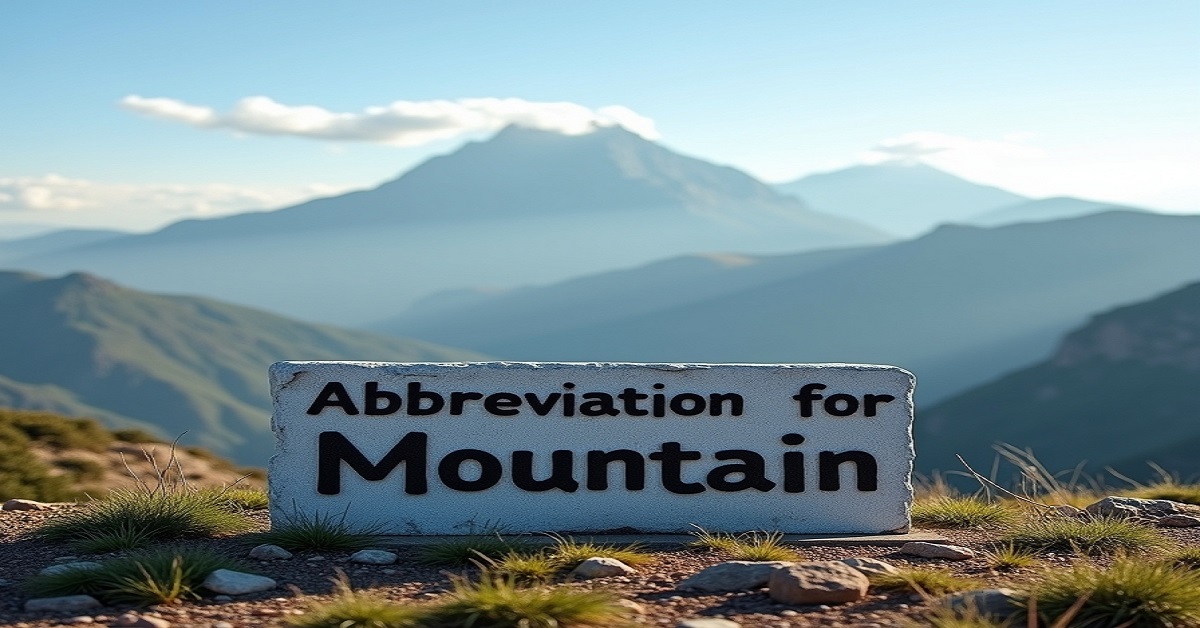When venturing through geographical terrains or studying cartography, the word “mountain” surfaces quite frequently. Mountains, towering and majestic, form the backbone of the Earth’s topography, shaping the climate, ecosystems, and human history. However, the use of the full term “mountain” can be cumbersome in certain contexts. This is where abbreviations like MTN come in. In this article, we’ll explore the abbreviation MTN for “mountain,” its meaning, pronunciation variations, historical evolution, synonyms, antonyms, and its significance in diverse contexts.
Whether you’re hiking, reading a map, or exploring cultural and historical references, the abbreviation MTN will appear in various forms across your journey. Let’s dive deeper into this fascinating linguistic shortcut and the mountains it represents.
What is the Abbreviation for Mountain?
The abbreviation “MTN” is a shorthand representation of the word mountain. It is often used to save space or simplify written text when referencing mountains, mountain ranges, or peaks in geographical, academic, or everyday contexts. Abbreviations like MTN are essential in fields where brevity is crucial, such as cartography, trail signs, business names, and mountaineering documentation.
For instance, MTN might appear on a map to indicate a mountain or mountain range, or it could be part of a business name or product like MTN Resorts. In short, MTN acts as a practical solution to abbreviate the expansive term “mountain” while keeping the meaning clear and recognizable.
Why Is the Abbreviation Important?
The abbreviation MTN is crucial in contexts where clarity and space efficiency are essential. When dealing with large-scale geographic data or business branding, abbreviations allow for quick identification and understanding without taking up unnecessary space. For example, when referring to a vast mountain range such as the Sierra Nevada Mountain Range, it’s easier to say Sierra Nevada MTN or MTN range, which keeps communication concise and easy to read.
The Meaning and Significance of MTN
At its core, the meaning of MTN remains simple: it stands for mountain. Yet, its significance stretches beyond just being a linguistic shortcut. Here’s why it’s widely used:
- Space Efficiency: Cartographers, mapmakers, and even hikers rely on MTN to fit geographical features into small spaces on maps or signage.
- Cultural Relevance: The abbreviation is commonly used in business names and product branding, especially in the outdoor gear industry (e.g., MTN Gear Co.).
- Historical Context: In linguistic terms, MTN serves as a reflection of human culture’s long-standing relationship with mountains, from ancient mythology to modern adventure tourism.
Ultimately, MTN doesn’t just serve as shorthand; it has embedded itself into our language, enabling quicker communication about vast, awe-inspiring landscapes.
Types of Mountains and Their Abbreviations
Mountains are as diverse as the cultures and ecosystems they support. Each type of mountain has unique characteristics, and understanding these types can provide a deeper appreciation of how the abbreviation MTN applies across different mountain forms.
1. Erosional Mountains
Erosional mountains are created through the gradual wearing down of the Earth’s surface by natural elements such as wind, water, and ice. Over millions of years, the landscape is reshaped, leading to the formation of what we now call mountains. The Appalachian Mountains in the United States, for example, are thought to be erosional in origin.
- Example: Appalachian MTN Range
These mountains typically feature more rounded and less jagged peaks compared to other types of mountains, as the forces of erosion smooth out the land.
2. Volcanic Mountains
Volcanic mountains, as the name suggests, form due to volcanic activity. These are the result of magma from the Earth’s mantle rising to the surface, solidifying, and accumulating over time. Volcanic mountains are often more steep-sided and can be the site of active volcanic activity.
- Example: Mount Fuji (MTN Fuji), Mount St. Helens (MTN St. Helens)
Volcanic mountains can be spectacularly scenic and are often the subject of awe and wonder. Their lava eruptions can create both danger and beauty in the surrounding landscapes.
3. Fold Mountains
Fold mountains are formed when tectonic plates collide and push the Earth’s crust upward. The Himalayas, home to the highest peak on Earth—Mount Everest—are the classic example of fold mountains. The Andes Mountains in South America are another prominent fold mountain range.
- Example: Himalayan MTN Range (MTN Everest)
Fold mountains are characterized by their rugged, jagged peaks and valleys, shaped by the immense pressure created by tectonic movement.
4. Block Mountains
Block mountains form when sections of the Earth’s crust are pushed up or down due to faulting. These mountains have a more angular and blocky appearance compared to other types of mountains.
- Example: Sierra Nevada MTN Range
These mountains often have steep faces and flat-topped peaks, and are significant in areas where tectonic forces are strong.
Pronunciation of “MTN”
The pronunciation of MTN can vary slightly depending on the context and region. In formal situations, such as academic discussions or cartographic references, MTN is typically pronounced letter by letter: “M-T-N”.
However, in more casual contexts, like when discussing well-known mountain ranges or businesses, you might hear the abbreviation pronounced as “Mountain”. For example, MTN Dew is commonly pronounced as “Mountain Dew”, and MTN Everest may simply be referred to as “Everest”.
Pronunciation Variations
| Region | Pronunciation | Example |
|---|---|---|
| American English | “M-T-N” | MTN Dew, MTN Everest |
| British English | “Mountain” | Mount Everest, Sierra Nevada MTN |
Examples of “MTN” in Context
The abbreviation MTN is used across many fields, from mapping and hiking to business and literature. Here are some practical examples:
- Geographical Maps: When you look at a trail map, MTN will be used to indicate mountains or mountain ranges. For example, MTN Everest and MTN Kilimanjaro are common labels found on such maps.
- Outdoor Business Names: Outdoor companies might use MTN in their brand names. For example, MTN Gear Co. could be a company that sells outdoor adventure products.
- Business Products: MTN Dew is a popular beverage brand, and its name utilizes the abbreviation for marketing purposes, associating the drink with outdoor adventure and nature.
Short vs. Long Abbreviations for Mountain
While MTN is the most commonly used abbreviation, you’ll also find other short forms, including Mtn, which is often used in more informal contexts. Whether to use MTN or Mtn largely depends on the specific context and audience, but both abbreviations serve the same purpose of simplifying the term “mountain.”
| Abbreviation | Usage | Example |
|---|---|---|
| MTN | More formal, common in maps and business names | MTN Everest, MTN Resorts |
| Mtn | Informal, commonly used in casual references | Mtn Ridge, Mtn Peak |
Acronyms Related to Mountain
In addition to MTN, other acronyms related to mountains can be found in specific fields, especially mountaineering and outdoor activities. Here are some noteworthy acronyms:
- HMT: High Mountain Trek, a term used in adventure tourism and mountaineering.
- MT: Often used as shorthand for “mountain” in more technical writing or to describe mountain-related activities.
Common Mountain Acronyms
| Acronym | Full Form | Example |
|---|---|---|
| HMT | High Mountain Trek | HMT Everest |
| MT | Mountain | MT Kilimanjaro |
These acronyms are essential for those involved in professional mountaineering or mountain tourism, as they help shorten long, cumbersome terms.
Synonyms and Antonyms for Mountain
Synonyms and antonyms help contextualize mountain in a variety of settings. Mountain has several synonyms depending on the specific characteristics of the terrain, and its antonyms generally describe features that are the opposite of elevated land.
Synonyms for Mountain
- Peak: Refers to the pointed top of a mountain, often the highest point.
- Summit: The highest point of a mountain, synonymous with peak.
- Ridge: A narrow crest of land, often connecting peaks.
- Range: A series of connected mountains that form a larger geographical feature.
Antonyms for Mountain
- Valley: A low area between mountains or hills, often with a river running through it.
- Plain: A large, flat area of land, usually with few or no hills.
The History of the Word “Mountain”
The word “mountain” has its roots in Latin. It originates from the word “montanus”, which referred to something related to a mountain. Over time, this term evolved through Old French, where it became “mont”, and eventually settled into modern English as mountain.
The long history of the word reflects the human fascination with these towering natural formations, which have played a central role in mythologies, cultures, and human settlement.
Etymology of “Mountain”
| Language | Word | Meaning |
|---|---|---|
| Latin | Montanus | Relating to mountains |
| Old French | Mont | A hill or mountain |
| English | Mountain | Elevated landmass, large hill |
When to Use “MTN” in Writing and Speech
The abbreviation MTN is most often used in specific contexts:
- Cartography: Maps, especially those used by hikers and adventurers, use MTN to represent mountains and mountain ranges.
- Business: Companies in the outdoor or adventure industries often use MTN as part of their brand or product names.
- Literature and Mythology: In written works, MTN is used as shorthand when referencing famous mountains, such as MTN Olympus in Greek mythology or MTN Kailash in Hindu and Buddhist traditions.
Contextual Use of MTN
| Context | Example |
|---|---|
| Maps | MTN Everest, MTN Rockies |
| Business Names | MTN Gear Co., MTN Resorts |
| Literature | MTN Olympus in Greek mythology |
Final Thoughts on the Abbreviation MTN
In conclusion, the abbreviation MTN is more than just a simple shorthand for “mountain.” It represents the geographical, cultural, and historical significance of mountains. From hiking and outdoor adventures to business names and cultural references, MTN has cemented its place in language and everyday communication.
Whether you’re navigating the towering heights of MTN Everest, exploring the MTN Fuji, or reading about ancient mythologies where MTN Olympus features prominently, the abbreviation MTN allows us to communicate more efficiently, saving time without sacrificing meaning.
By understanding the meaning, uses, and history of MTN, we gain a greater appreciation for the mountains that shape our world and continue to inspire awe, adventure, and discovery.

Tony James is a passionate wordsmith and the creative force behind Winky Hive. With a knack for uncovering the stories behind slang and weaving emotions into poetry, Tony brings a unique voice to every piece he writes. A lifelong lover of language, he thrives on exploring how words evolve, connect, and inspire.
When he’s not penning articles or crafting verses, Tony enjoys diving into cultural trends, reading classic poetry, and discovering hidden gems in modern expressions. His mission? To make Winky Hive a haven for those who love the art of language in all its vibrant forms.









